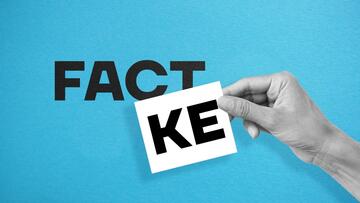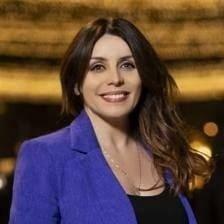
© Jack_the_sparow via Shutterstock
Klodjana Kapo is a journalist and the director of Faktoje , a prominent Albanian fact-checking organisation. She is a key member of both the International and European Fact-Checking Networks. With extensive experience in investigative reporting and fact verification, she leads Faktoje's mission to ensure transparency and accountability in media coverage, contributing significantly to the fight against disinformation in Albania and beyond.
Albania is ranked 99th in the 2024 Reporters Without Borders . The EU has also expressed concern over limited progress in media freedom on several occasions. Can you elaborate on the main challenges to media freedom in the country?
I would say that there are three main factors that limit media freedom in Albania. One of the main problems is connected to media ownership. The second issue is the working conditions and lack of contracts to protect journalists. The third are the attacks or intimidations of journalists that come from politicians or businesses.
It depends on who we refer to. Informed and educated people, and international institutions are aware. The report of freedom house Young people, as we know, mostly use social networks to gather information, so I am afraid they are not aware of the situation of traditional media.
At the same time, if we refer to most common people, I am afraid that they are not aware of these problems either. What we at Faktoje have observed over the past years is that people don’t trust politicians or their parties. They are concerned about their daily life and focus on concrete things that impact their lives: they are interested in work, in a good salary, and a good education.
There is large number of international organizations like the EU, the Council of Europe, OSCE, UNESCO that work on media freedom. How would you evaluate their success in this area? How much dialogue is there between civil society and media organizations?
I believe that their work is crucial for us. If any of these partners were absent, our work would be very difficult. It is difficult for small countries like ours to have a free media sector that can do its work without interference by the business sector or by politicians.
Civil society and the media need to build stronger collaborations to be more vocal and reach out to a larger audience, including the youth.
Is there a coalition of civil society actors or media organizations that work for the protection of journalists and media freedom in Albania?
Civil society actors and media organizations collaborate with each other but the main issue is we do not have a syndicate of journalists which is important for the protection of journalists’ rights. We do have a union of journalists but it cannot do much. What we really need is a syndicate which can protect and advocate for journalists' rights in an institutionalised way. We organise petitions and protests when journalists are threatened or intimidated, but we need an institution that can protect journalists’ rights collectively, and not only in single cases.
Do you have experience in collaborating with international organizations for the protection of media freedom?
Yes, we have collaborated with organizations in Brussels that advocate for the rights of journalists. These organizations provide support, knowledge, and resources, but we need a solid structure in Albania that would help journalists know where to turn for protection. There are several instances of journalists working for months without pay and many risking losing their jobs overnight due to change in the outlet’s management.
What can be done in your opinion to strengthen civil society and media organisations?
I think it is an internal problem. We need to collaborate more closely with each other. Civil society needs to be more united and visible, but to truly be effective, we must also collaborate with key institutions. Operating as isolated entities won't fetch much good. One example of a significant victory was our collective protest against the draft defamation package. We all came together, protested, and engaged with the Media Commission and Members of Parlianment As a result, the Parliament did not approve the defamation package.
The low effectiveness of the opposition is a problem . We provide data and evidence, but we struggle to hold public institutions accountable. Civil society and media organizations are engaged, but without a strong opposition that takes up our demands what can really happen?
What is more, Albanian people rarely protest for their rights. People protest only when politicians ask them to. Hence, it is a real challenge to hold people in power accountable here.
What are the most typical topics you fact-check?
We fact-check promises of the government and the opposition. We focus more on the power holders and a lot of our work revolves around checking claims about public investments. We also check environmental projects where they’ve changed the protection status of certain areas, allowing construction in places that should be safeguarded.
We also fact-check disinformation from outside Albania. The disinformation often involves anti-NATO or anti-EU messages, where images or videos from outlets like Russia Today or Telegram are translated and shared in Albanian media. It's crucial that we monitor and debunk these narratives.
Can Albania’s situation be compared to other countries in Europe?
No, it is not the same. It is important to say that we need improvement in the main sectors, public transportation. education, health, and the most important thing to have is real protection from syndicates. When a miner or a person that works in construction loses his life or is injured, who protects their rights?! Why do we have to pay for oil or food more than in many countries of the EU. Who is responsible to protect our rights?
In other countries, there is at least protection from syndicates and organizations like yours. But here, there is no protection. When people go to work they need to feel secure and safe. Albania has been a transitional country for over 30 years and we are facing problemes that are affecting our daily life like public transport, lack of qulity in education or health system etc
There is a general sense that the value of meritocracy is lost . People who follow rules and are educated are often not respected and considered. People with the ability to make fast money and are powerful are considered successful. This is a big problem because young people who come to Albania with their standards and work ethics don’t find themselves fitting in. Experts in public institutions are valued based on their connections and not merit in Albania. Unfortunately, the system is flooded with people who were hired based on who they know, rather than the skills they bring to the table. This imbalance creates significant problems.
This publication is the result of activities carried out within the Media Freedom Rapid Response and within ATLIB - Transnational Advocacy for Freedom of Information in the Western Balkans, a project co-funded by the Italian Ministry of Foreign Affairs and International Cooperation. All opinions expressed represent the views of their author and not those of the co-funding institutions.
Tags: Albania Fact-checking Media freedom
This content is part of the Media Freedom Rapid Response (MFRR), a Europe-wide mechanism which tracks, monitors and responds to violations of press and media freedom in EU Member States and Candidate Countries. The project is co-funded by the European Commission.



